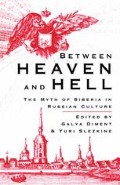Abstract
Siberian literature—Russian-language literature about Siberia produced by Siberians or by European Russian writers who (voluntarily or otherwise) spent time in Siberia—is a distinct phenomenon in Russian letters. It is marked by a specificity of thematic concerns and literary images that serve to define it as a special category within Russian literature as a whole. This specificity can be analyzed through an identification and description of peculiarly Siberian elements in the works of individual writers and a diachronic comparison of the writers based upon these elements. The present study will offer a contribution to such a comparison by examining The Life Written by Himself of the Archpriest Avvakum Petrovich (1620?-82),1 who spent nearly eleven years in Siberian exile.
Access this chapter
Tax calculation will be finalised at checkout
Purchases are for personal use only
Preview
Unable to display preview. Download preview PDF.
Notes
The edition of the Life cited herein is Brostrom’s English translation (Avvakum Petrovich, Archpriest Avvakum: The Life Written by Himself, trans. Kenneth N. Brostrom [Ann Arbor: Michigan Slavic Publications, 1979]), which accurately conveys both the content and the style of Avvakum’s original. Brostrom’s translation is based on what has traditionally been called “Redaction A,” actually the third of four variants which Avvakum wrote between 1669 and 1675 (
Priscilla Hunt, “Avvakum,” in Victor Terras, ed., The Handbook of Russian Literature [New Haven: Yale University Press, 1985], p. 31). For a history of the text and comparative study of its various redactions, see
N. S. Demkova, Zhitie protopopa Avvakuma: Tvorcheskaia istorila proizvedeniia (Leningrad: Izdatel’stvo LGU, 1974).
Alan Wood, “Avvakum’s Siberian Exile: 1653–64,” in Alan Wood and R. A. French, eds., The Development of Siberia: People and Resources (New York: St. Martin’s Press, 1989), p. 11.
For more information on Avvakum’s life, see Pierre Pascal’s definitive biography Avvakum et les Débuts du raskol (Paris: Mouton, 1969); for information specifically on the time Avvakum spent on Siberia, see Wood, “Avvakum’s Siberian Exile,” which deals solely with biography, and V. Gusev, who also comments, albeit briefly, on Avvakum’s literary images of Siberia: V. Gusev, “Avvakum Petrov i Sibir’ [1620 ili 1621–1682],” in V. P. Trushkin, ed., Literaturnaia Sibir’: Kritiko-bibliograficheskii slovar’ pisatelei Vostochnoi Sibiri (Irkutsk: Vostochno-sibirskoe knizhnoe izdatel’stvo, 1986), vol. 1, pp. 35–40. For a discussion of Pashkov’s expedition, see Pierre Pascal, “La conquêt de L’Amour: Les première expéditions Pashkov et ses préparatifs,” Revue des Études Slaves, no. 25 (1949): 7–21.
It is possible to view the Life not only as a precursor of later secular Russian literature but also as the concluding work of an earlier tradition. Børtnes, for example, calls it “the last great hagiographical work in old Russian literature” and points out that as Avvakum reworked the text “the hagiographical element [became] more pronounced with each new version.” See Jostein Børtnes, “The Literature of Old Russia, 988–1730,” in Charles A. Moser, ed., The Cambridge History of Russian Literature (Cambridge: Cambridge University Press, 1989), pp. 38–39. In the context of “Siberian literature,” however, the Life is definitely a forward-looking work.
Later writers have been struck by Avvakum’s infusion of spirituality into his description of Siberia. Valentin Rasputin, in an essay decrying the use of Lake Baikal’s resources for industrial purposes, begins with a verbatim quotation of Avvakum’s description of the lake, and goes on to list Baikal’s traditional epithets: the “Holy Sea,” the “Holy Lake,” the “Holy Waters.” Valentin Rasputin, Izbrannye proizvedeniia v dvukh tomakh (Moscow: Molodaia gvardiia, 1984), vol. 2, p. 437.
Avvakum, Archpriest, p. 74. In a recently published Jungian analysis of literature and the experience of exile, Bettina Knapp argues that “tormentor [and] convict are, to some degree, mirror images of each other. The tormentor, as the aggressor, is the actor, but he also becomes a passive recipient by identifying himself with his victim. The same duality holds true for the convict, who, seeing himself in the role of the persecuted, martyred, or sacrificial agent being acted upon, also identifies with the tormentor, thus becoming a prosecutor.” Bettina Knapp, Exile and the Writer: Exotic and Esoteric Experiences: A Jungian Approach (University Park: Penn State University Press, 1991), p. 35. These comments are meant to be universally applicable, but their specific referent is Dostoevsky’s Notes from the House of the Dead, of which Avvakum’s Life is often cited as a precursor. Regardless of whether Jung can be used to explain the reversal of roles, Avvakum’s surprising suggestion that he is both the victim and the victimizer of Pashkov is intriguing.
Editor information
Editors and Affiliations
Copyright information
© 1993 Galya Diment and Yuri Slezkine
About this chapter
Cite this chapter
Holl, B.T. (1993). Avvakum and the Genesis of Siberian Literature. In: Diment, G., Slezkine, Y. (eds) Between Heaven and Hell. Palgrave Macmillan, New York. https://doi.org/10.1007/978-1-137-08914-4_3
Download citation
DOI: https://doi.org/10.1007/978-1-137-08914-4_3
Publisher Name: Palgrave Macmillan, New York
Print ISBN: 978-1-349-60553-8
Online ISBN: 978-1-137-08914-4
eBook Packages: Palgrave History CollectionHistory (R0)

